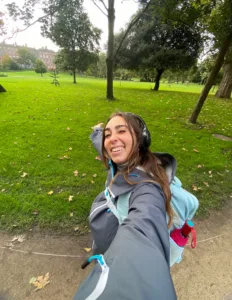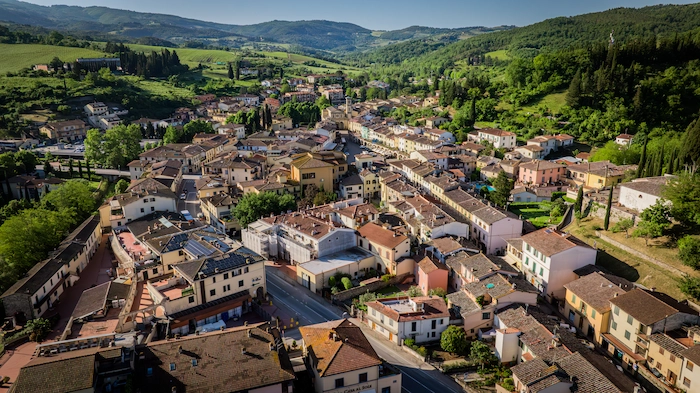Italy
Study Abroad in Italy
While living in the heart of Tuscany learn how rural development, agricultural practices, and food system policy affect the agricultural, natural, and semi-natural ecosystems, and the health and wealth of farmers and local communities. Research contrasting ecosystems, such as the coastal flat land and salty lagoons of Maremma in southwestern Tuscany, the smooth, hilly agricultural landscape of vineyards and olive groves in Chianti, and the mountainous, natural pastures and chestnut woods of Mugello and Casentino in northeastern Tuscany. On a weeklong excursion to Sicily, you’ll explore the diverse and contrasting food systems and culture of central and southern Italy.
Programs
Sustaining Traditions: Food, Farming, and Climate
See Program Costs
Program Costs
- Tuition
- Room & Board
- Total
Where You'll be Living
The program is in the ancient city of Greve, nestled in the gentle rolling hills of Chianti. Greve’s main piazza contains multiple medieval-era buildings with numerous restaurants, shops, and museums to explore. Greve also hosts a weekly farmers’ market that attracts both residents from nearby cities and international tourists.
Creating shared community around food is an important aspect of the program. You’ll live in shared apartments in town and immerse yourself in group living through food culture. Share responsibility for cooking, budgeting, shopping, and preparing meals, and enjoy the deeply rooted Italian tradition of connecting over food.
- Shared and furnished apartments a short walking distance from the classroom, where you’ll meet daily for class and excursions
- Apartments are equipped with cooking facilities, bathrooms, living room, a small garden, and WiFi
- Lunch and snacks provided at the dining hall on program days
- A weekly food stipend is provided to plan and cook breakfasts and dinners together, connecting through the process of food shopping and culinary pursuits
- Travel easily to other Italian and European destinations during designated long weekends or mid-semester break
Know before you go
Click on each dropdown to explore details about life at this Center, and determine if it’s the right fit for you.
Program experience
Living Conditions & Daily Life
Students follow a varied academic schedule, with classes and field activities typically from 9 AM to 5 PM. Evenings and most weekends are free, offering time for rest, local exploration, or participation in optional group activities.
Students live in shared apartment-style housing and are responsible for preparing their own meals, supported by a weekly grocery stipend. Some group meals are provided during field excursions. A daily curfew and quiet hours are observed throughout the program, including for students who remain in Greve during weekends.
Physical Readiness
Fieldwork includes visits to farms, biodiversity observation, and engagement with local communities. Terrain may be muddy, steep, and uneven, with many streets paved in cobblestones. Elevators are uncommon—student housing does not have one, and all participants must be able to navigate stairs daily.
Field days may include long walks or standing for extended periods in varied environments. Accessibility for students with mobility impairments is limited.
Travel & Transitions
Students are based in Greve in Chianti, about 45 minutes from Florence by bus, and frequently travel to field sites throughout Tuscany. Travel includes winding rural roads and occasional overnight stays in different regions. The schedule blends classroom time and fieldwork, requiring flexibility and adaptability to weather and logistical changes.
Location & Culture
Program Location & Natural Environment
Greve is a quaint town in Tuscany, surrounded by vineyards, olive groves, and scenic countryside. Students experience a blend of historic sites, bustling town life, and peaceful natural areas. Restaurants, grocery stores, pharmacies, and cafes are centrally located within walking distance of student housing.
In summer, temperatures may exceed 100°F (40°C) and air conditioning is not available in student housing. Humidity, wind, and rain vary by season, and mosquitoes are common, especially in warmer months.
Cultural & Linguistic Differences
Italian culture is rich in regional customs, with conservative dress norms in many public settings. Athletic wear is typically reserved for recreational activities.
Italian is the primary language, and while many locals speak English in tourist areas, using Italian is preferred in Greve. Students are not required to know the language, but basic Italian phrases are taught and encouraged to enhance cultural immersion and everyday communication. All coursework is conducted in English.
health
Allergies & Dietary Preferences
Italian cuisine features gluten, dairy, red meat, and seafood as staples. Dishes such as pasta, risotto, and pizza are common. Students must prepare most of their own meals but will occasionally dine at local establishments or participate in group meals during travel.
Those with food allergies must communicate clearly with staff and roommates, especially in shared kitchen spaces. Gluten and dairy allergies that require no-cross contamination can be very challenging to navigate while traveling in Italy. Cross-contamination risks may exist, particularly when dining at local restaurants, and students with severe allergies should consult studentlife@fieldstudies.org before applying.
Required Vaccinations & Health Care
SFS does not require specific vaccinations for this program. For additional recommendations, consultation with a travel medicine professional is strongly advised before departure.
Basic medical care is located five minutes from student housing, while advanced care is approximately 30 minutes away. Ambulance services are readily available, but students may be 2+ hours from care while traveling. Psychiatric and advanced mental health services may require advance planning.
Routine in-person medical and counseling services are not feasible during the program. Participants must bring a full supply of any prescription medications, including psychotropic medications, for the entire duration of the program, as local refills may not be available without prior arrangements.
PRogram Costs
Study abroad is an investment in yourself – you’ll return home with new experiences, skills, knowledge, and friendships that will stay with you for the rest of your life. SFS program costs cover a variety of expenses, including:
- Pre-program advising and on-site orientation
- Tuition and research fees
- Housing at the field station and on excursions
- Daily meals and snacks
- Airport transfers (for arrival/departure)
- Field excursions and cultural activities
- Student success and wellness team on site
- 24/7 mental health and well-being support
- Emergency evacuation and repatriation insurance
- Official transcript processing
Financial Aid
We know cost can be one of the biggest barriers to studying abroad. At SFS, we’re committed to making our programs accessible to students which is why we award a generous amount in need-based financial aid each year. Our Admissions Team has worked with thousands of students and are here to answer your questions about the SFS aid process, aid available through your home school, and funding from external sources.
SFS Financial Aid: Need-based aid packages typically consist of a combination of scholarships, grants, and zero- and low-interest loans. SFS matches Federal Pell Grant funding for students applying to an SFS semester program.
Home School Aid: Be sure to ask your home school study abroad office or financial aid office what financial aid resources might be available to support your study abroad experience.
External Funding Opportunities: Organizations such as the Fund for Education Abroad or the Gilman International Scholarship Program award scholarships to students going abroad. These can be a great opportunity to reduce the cost of your program even more.
Research
Our research at the SFS Center for Sustainable Food Systems analyzes the integration of environmental, sociocultural, and economic dimensions of food systems to achieve sustainability in different agroecological contexts. Conservation of wild ecosystems and/or agrobiodiversity is addressed in all research projects, which follow an interdisciplinary approach incorporating both natural and social sciences. Field research is carried out on vegetable and cereal cultivation, horse, sheep, goat, and cattle rearing, artisanal fisheries, vineyards and olive groves, and in multi-use agroforestry operations. At the end of the semester program, students will present their research findings and experience to the local community, government, and key stakeholders from the program.
Our research focuses primarily on the following themes:
- Conservation of local agrobiodiversity by farmers
- Climate change impacts on food production
- Sustainability of organic agriculture and small-scale fisheries
- Livestock-wolf conflict management
- Stewardship of endangered heritage livestock breeds
- Multifunctional forest management
Community
With a population of 14,000, the hilly terrain of Chianti forms the center of Tuscany, sandwiched between the cities of Florence and Siena. The predominant land use in Chianti is a mixture of vineyards and olive groves, but nearly 45% of the territory is covered by woodland. Greve is approximately 15 miles from Florence and offers efficient public transport facilities to major cities and airports.
Students become members of the Greve community during the program, living in shared apartments in town. Away from the chaos of the major cities, students are part of small-town living, practicing Italian language skills while out at local restaurants, shopping in the organic farmers market, and socializing with neighbors and local families. A unique Italian study abroad experience, students learn to cook in groups and share conversation at the table, a cultural mainstay of the traditional Italian way of life.
Meet the Italy Team




